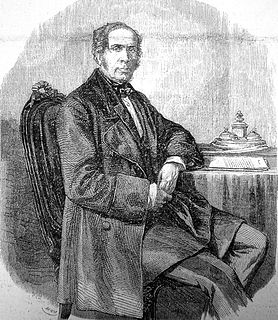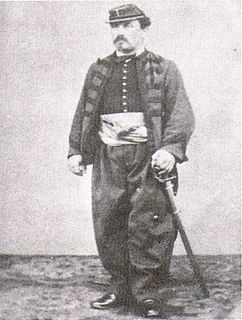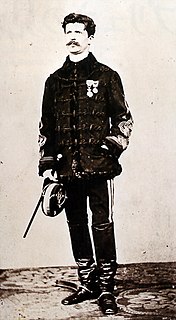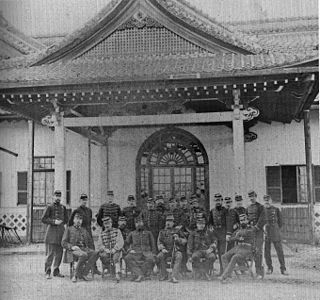
Jean-Baptiste-Louis Gros (1793–1870), also known as Baron Gros, was a French diplomat and later senator, as well as a notable pioneer of photography.

The history of relations between France and Japan goes back to the early 17th century, when a Japanese samurai and ambassador on his way to Rome landed for a few days in Saint-Tropez and created a sensation. France and Japan have enjoyed a very robust and progressive relationship spanning centuries through various contacts in each other's countries by senior representatives, strategic efforts, and cultural exchanges.

Jean Marlin (1833–1872) was a non-commissioned officer, a sergeant of the French 8th Battalion of infantry. He was a member of the first French military mission to Japan in 1867, in which he accompanied Jules Brunet. He worked as an instructor for infantry in the army of the Tokugawa shogunate.

François Bouffier (1844–1881) was a French non-commissioned officer of the 19th century, a sergeant of the 8th Battalion of infantrymen. He was a member of the first French Military Mission to Japan in 1867, in which he accompanied Jules Brunet. He worked as an instructor for infantry in the army of the shōgun.

The French military mission of 1867-1868 was one of the first foreign military training missions to Japan, and the first sent by France. It was formed by emperor Napoléon III following a request from the Tokugawa shogunate through its emissary to Europe, Shibata Takenaka, with the goal of modernizing the Japanese military.

Jules Brunet was a French military officer who served the Tokugawa shogunate during the Boshin War in Japan. Originally sent to Japan as an artillery instructor with the French military mission of 1867, he refused to leave the country after the shōgun was defeated, and played a leading role in the separatist Republic of Ezo and its fight against forces of the Meiji Restoration. After the rebellion's defeat he returned to France, fought in the Franco-Prussian War, and later reached the rank of general of division and worked for the Ministry of War.

The 1872–1880 French military mission to Japan was the second French military mission to that country and the first sent by the Third Republic. It followed the first French military mission to Japan (1867–68), which had ended with the Boshin War and the establishment of the rule of Emperor Meiji.

The 1884 French Military Mission to Japan was the third French military mission to that country and consisted of five men.

The development of France-Japan relations in the 19th century coincided with Japan's opening to the Western world, following two centuries of seclusion under the "Sakoku" system and France's expansionist policy in Asia. The two countries became very important partners from the second half of the 19th century in the military, economic, legal and artistic fields. The Bakufu modernized its army through the assistance of French military missions, and Japan later relied on France for several aspects of its modernization, particularly the development of a shipbuilding industry during the early years of the Imperial Japanese Navy, and the development of a Legal code. France also derived part of its modern artistic inspiration from Japanese art, essentially through Japonism and its influence on Impressionism, and almost completely relied on Japan for its prosperous silk industry

Guillaume Courtet (1589–1637) was a French Dominican priest who has been described as the first Frenchman to have visited Japan. He was martyred in 1637 and canonized in 1987.

Gustave Duchesne, Prince de Bellecourt (1817–1881) was a 19th-century French diplomat who was active in Asia, and especially in Japan. He was the first French official representative in Japan from 1859 to 1864, following the signature of the Treaty of Amity and Commerce between France and Japan in 1858.

François de Casembroot was an officer of the Royal Netherlands Navy.

Johann Caspar Horner was a Swiss physicist, mathematician and astronomer.

The Treaty of Amity and Commerce between France and Japan (1858) opened diplomatic relations and trade between the two counties.

The Ansei Treaties (Japanese:安政条約) or the Ansei Five-Power Treaties (Japanese:安政五カ国条約) are a series of treaties signed in 1858, during the Japanese Ansei era, between Japan on the one side, and the United States, Great Britain, Russia, Netherlands and France on the other. The first treaty, also called the Harris Treaty, was signed by the United States in July 1858, with France, Russia, Britain and the Netherlands quickly followed within the year: Japan applied to the other nations the conditions granted to the United States under the "most favoured nation" provision.
Japanese people in France are French residents and citizens of Japanese ancestry, including both those who have settled in France permanently and those born in the country, along with a significant community of short-term expatriates who spend at most a few years in the country before moving on.

The Paris Metropolitan Area includes a Japanese community. In 2013 the official number of Japanese residents in Paris was 16,277.
Jacques-Paul Faure was an officer of the French Army. He studied in the French Ecole Polytechnique. He led the French Military Mission to Japan (1918-1919).
Francine Hérail is a French historian specializing in Japan. Former resident at the Maison franco-japonaise in Tokyo, she was professor at the Institut national des langues et civilisations orientales until 1981, then director of studies at the École pratique des hautes études until 1998.
Christian Galan is a French Japanologist and professor of Japanese language and civilization at Toulouse-Jean-Jaurès University and a researcher at the Japanese Studies Center (CEJ) of the National Institute for Oriental Languages and Civilizations. He has devoted most of his work to the study of the Japanese education system.














